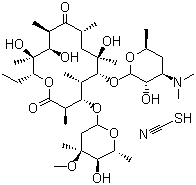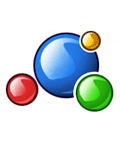Erythromycin thiocyanate
-
- Category :
Pharmaceuticals and Biochemicals/Antibiotic and antimicrobial agents
- CAS NO : 7704-67-8
- EC NO : 231-723-1
- Molecular Formula : C38H68N2O13S
- Main Specifications : USP
- Synonyms : Erythromycin, thiocyanate (salt);(3R,4S,5S,6R,7R,9R,11R,12R,13S,14R)-6-{[(2S,3R,4S,6R)-4-(dimethylamino)-3-hydroxy-6-methyltetrahydro-2H-pyran-2-yl]oxy}-14-ethyl-7,12,13-trihydroxy-4-{[(2R,4R,5S,6S)-5-hydroxy-4-methoxy-4,6-dimethyltetrahydro-2H-pyran-2-yl]oxy}-3,5,7,9,11,13-hexamethyloxacyclotetradecane-2,10-dione thiocyanate (1:1) (non-preferred name);Erythromycin Thiocyanante;
Package: 20bou/drum
Uses : antibacterial
Molecular Structure:

Product description:
White Or Almost White Crystalline Powder
On Dry Basis
≥ 750u/mg
Erythromycin thiocyanate is a type of antibacterial. It acts on actively- dividing bacteria during their growth with a prompt curative effect. Its action mode is the inhibition of protein synthesis at the bacterial ribosomal 50s sub-unit level by blockading transpeptidase and the displacment of mRNA.
Erythromycin thiocyanate has strong antibacterial effect against gram-positive bacteria such as staphylococcus aureus (including penicillin-resistant bacteria), pneumococcus, streptococci, anthrax bacillus, swine erysipelothrix, listeria, clostridium putrificum, and clostridium chauvoe, etc. Sensitive gram-negative bacteria include H. Influenzae, neisseria meningitides, brucella, pasteurella, and so on. Insensitive ones are mainly enteric bacilli such as colibacillus and salmonella. In addition, Erythromycin thiocyanate also has good effect against Campylobacter, some leptospira, mycoplasma, rickettsial and Chlamydia.
